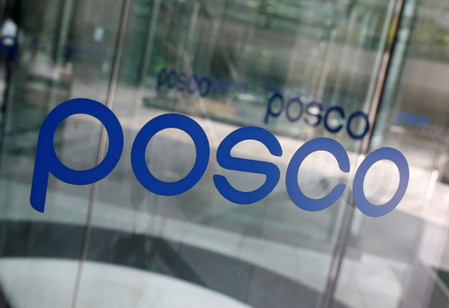By Joyce Lee and Heekyong Yang
SEOUL (Reuters) -South Korea’s POSCO Holdings on Monday forecast weak steel demand would persist into the first half of next year after a price slump and a production halt at its second-biggest plant led to a 71% fall in third-quarter operating profit.
The holding company of South Korea’s biggest steelmaker said its consolidated operating profit fell to 900 billion won ($625.29 million) in the July-September quarter, in line with guidance issued last week.
Steelmaking unit POSCO’s operating profit margin plunged to 3.6% in the quarter from 20.3% a year because of price drops in key products as well as one-off losses from flood damage at its Pohang, South Korea plant following a typhoon last month.
The plant has not yet returned to full production, but POSCO said it planned to resume supplying all of the downstream products it makes by the end of the year.
The fall in earnings comes as global steel demand is weakening amid surging inflation, interest rates and a property market slump in China, the world’s biggest steel market.
China this month stood by its strict zero-COVID policy, dashing hopes that Beijing could begin exiting an approach that has caused economic damage.
Global steel demand is expected to grow by about 1% next year, while demand in South Korea is expected to remain flat, POSCO said.
The company’s head of marketing strategy, Eom Gichen, said steel demand was expected to remain to weak in the first half of next year because of economic factors like austerity measures.
“Supply expansion will also be limited as steelmakers focus on reducing carbon emissions instead of quantitative growth,” he said on an earnings call. “Demand is expected to improve from the second half of next year when austerity policies are somewhat eased.”
POSCO has been expanding into new businesses for diversification, including minerals used in electric vehicles such as lithium.
The company’s third-quarter sales rose 3% to 21.2 trillion won because of an increase in prices at its energy and chemical units.
(Reporting by Joyce Lee and Heekyong Yang; Editing by Jamie Freed)

